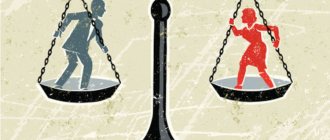Updated July 24, 2021 939 Author: Dmitry Petrov
Hello, dear readers of the KtoNaNovenkogo.ru blog. Test. You are in a difficult life situation (happens to everyone). In your opinion, is this the will (finger) of fate, or are you (or someone else) to blame for what happened?
Will you look for signs that will tell you where to move next, or will you make a decision to get out of a difficult situation on your own?
Simply put: are you a fatalist or a realist?
Who is a fatalist
A fatalist is a person who likes to attribute all events that occur to the vicissitudes of fate. He believes in its irrevocability and relies on a fatal accident.
If we talk about the definition in simple words, then the fatalist believes that nothing depends on his actions and decisions. Everything is invented and described from above; man’s task is to obey.
The concept of the butterfly effect is often associated with the concept of fatalism. The butterfly effect means that any event, no matter how small, can affect what happens in the future.
Question to the expert
What do fatalists believe?
Fatalists believe in fatality, fate, evil fate, destiny. They believe that they cannot influence anything.
Question to the expert
Who can be called a fatalist?
A fatalist can be called a person who denies his responsibility for his actions. Examples in the table.
| A husband cheating on his wife, who believes that fate itself brought him together with his mistress, and he can’t do anything. | People who take out a lot of loans drive themselves into a money hole, and then blame evil fate for what happened. | A guy who was dumped by a girl because of his bad character, who believes that he is simply not destined to build a strong relationship. |
Question to the expert
A fatalist is an absolutely weak-willed person, or is there free will to take one’s own life into one’s hands?
Fatalists interpret the concept of will in different ways. Someone completely denies their influence on what is happening. Others think less radically. They believe that it is possible to change something, but only in small quantities.
PROS and CONS of fatalism
Remember Julius Caesar, who knew about his terrible fate, but blinded by pride and faith in fate, simply came to meet his killers?
The main distinguishing feature that most fatalists are endowed with is pride. This quality can be attributed to the disadvantages of fatalism. Therefore, a fatalist is a person who, because of his own pride, easily exposes himself and others to danger. Sometimes you can be proud of the trials sent by fate. Another disadvantage of believing in fate is weakened critical thinking. Such thinking in an individual who believes in fate is either not developed at all or is suppressed. Here, a fatalist in psychology is a person who, since childhood, has not learned to cope with life’s difficulties for various reasons. In childhood, a person who is too focused on the opinions of others and has lost faith in his own abilities loses adaptability and begins to think that all his attempts to act independently are doomed to failure.
The undoubted advantage of this theory is humility in front of what is happening in life. A person of fate sincerely believes in inevitability, which means he worries less about the consequences and endures adversity more easily. Maintains faith in one's own good beginnings under any circumstances.
Appearance and history
The beginnings of fatality appeared in the mythology of Ancient Greece. People believed in Moira - goddesses who weave the threads of destinies. If the goddess wanted to cut the thread, then the person’s life would be cut short. In Scandinavian mythology there were similar creatures - Norns.
During Antiquity, such a movement of philosophy as fatalism arose, and it was actively discussed who a fatalist was. The essence of the flow is that there are historical and life patterns. That is, all events in a person’s life are predetermined in advance, so there is no need to make efforts and try to change anything.
This philosophical movement had many opponents. Adherents of other philosophical schools and movements called fatalism a “lazy” phenomenon.
Fatalism manifested itself most clearly in China during times of political and social unrest under Confucianism. By the will of heaven, the Chinese justified the dominance of the privileged classes. Fatalism called for a person to be passive and completely submit to circumstances. With the help of this dogma it was easy to control the lower strata of the population, who, in fact, had nothing.
However, adherents of fatalism exist to this day. The trend received a new round in the 19th and 20th centuries thanks to the development of criminology. A person’s criminal behavior in this context was often explained by his heredity and biological processes occurring in the body.
The impact of fatal self-confidence on the future
According to psychologists, self-confidence is an important social quality that helps a person achieve heights in life. There is a special type of fatalists who are convinced that the outcome of any case will certainly be positive. Such people have well-developed self-confidence. To develop this personal trait, you need:
- Engage in constant self-development. You need not only to improve your personal qualities, but also to learn new things and try yourself in new activities. Any life situation should be considered as a chance to prove yourself, to know your own boundaries and resources. This position gives a person the opportunity to discover his weaknesses and outline the path of self-development.
- A person must set himself a high enough standard in any endeavor so that he has to put in effort and patience in the process of achieving the goal. It strengthens the spirit. If you succeed in achieving your goal, your self-confidence will increase.
- If difficulties arise, you need to learn to ask for help from loved ones. There's no shame in this. The life principle of a self-confident fatalist is the phrase: “Today they helped me, and tomorrow I will help.”
- Self-confidence is formed in the process of a person defending his own views and interests. In order to justify his position and life beliefs, a person needs to develop communication skills.
- An important component of self-confidence is a person’s ability to firmly refuse the dubious proposals of his comrades.
- To become confident, a person needs to believe that it is possible.
Why people become fatalists - reasons
Often a person, without realizing it, can become a fatalist. In humans, fatalism appears due to low self-esteem and self-doubt. He does not believe that he can change anything in his life on his own, so he is used to attributing failures to the factor of fate. Why does a person develop low self-esteem and fatalistic ideas about life:
- The child was overprotected in childhood. Caring parents dreamed of protecting their child from life's difficulties and problems. He was not allowed to take a single step on his own. The volitional sphere and adaptability to life in such a child are not developed. In adult life, it is easier for him to blame others for failures or to blame everything on evil fate.
- He had a negative example before his eyes. Perhaps his parents or other relatives relied too much on fate and inspired him that a person is not able to change anything, so he needs to adapt to circumstances.
- Parents devalued the child’s achievements and did not believe in him. All people, and especially children, need the support of loved ones. Perhaps the child was trying to do something to please his parents and please them. In response to his efforts, he heard only an indifferent “Well, well done” or “All children sculpt animals from plasticine, there is nothing outstanding about that.” A dissatisfied child with himself, who grew into an equally dissatisfied adult, began to blame life for everything.
What exactly do you think creates an inner fatalist in a person? Share your conclusions and reasoning in the comments.
We invite you to watch a video about fate from a physics point of view, stunning facts.
What leads to a fatal perception of the world
Whether a person will become a fatalist depends on his upbringing and further ups and downs of life. If the parents were very protective of the child, not allowing him to solve difficult situations on his own, then he will not gain life experience and will not be able to solve problems that arise.
When he grows up, he will listen more to the opinions of others, and not be guided by his own, because he has been accustomed to this since childhood. Naturally, in such a situation it will be very easy to attribute everything to fate (fatum, inevitable fate).
Low self-esteem, which could be formed from the influence of various factors, can also lead to fatal behavior. For example, from disrespect in the family and among peers to the presence of a defect that created an inferiority complex. It is easier for a person who is unsure of his own abilities to let his life go to the mercy of fate.
Portrait of a Fatalist
To sum it up, this is someone who:
- thinks that everything around is predetermined, and the series of events is not a coincidence;
- has a pessimistic mindset because problems cannot be avoided with a passive approach;
- does not believe in his own capabilities and strengths, because fate is stronger;
- does not take responsibility for everything that happens to him (evil fate);
- often superstitious - believes in horoscopes and other predictions, since it has already been formed somewhere.
It turns out that this is my portrait, but for some reason I don’t perceive myself in such a black color. Anyway.
Types of fatalistic people
Fatalists can manifest the characteristics of their worldview in different ways.
| A type of fatalism. | Description. | Example. |
| Domestic. | A person believes that all failures happen to him due to bad luck or circumstances. | The young man was negligent in following traffic rules while driving a car. One day he had an accident and seriously injured his leg. He is sure that someone has jinxed him or cast a spell on him. |
| Religious. | A person considers everything that happens to be a divine purpose, which cannot be circumvented. | Fatalistic students do not want to prepare intensively for exams and rely on luck and “the will of God.” |
| Logical. | It can be logically justified, a person builds an evidential chain of events. Accidents are impossible, since every event has a root cause. | The man was not hired for the job he had long dreamed of. He chalked it all up to bad luck and an absurd accident. In fact, the boss turned out to be a boy who had been in the same kindergarten group with this man for several months. It was at that time that a man who was not hired mocked him, but he had already forgotten about it. The boy grew into a boss and decided to take revenge on his offender by denying him his position. |
The author's fateful mistake
Jack London is an eternal author, that is, he will be read as long as the English language and people capable of translating from it exist, but he also made a mistake that cost his hero dearly. The astute reader will understand what is at stake. Jack London believed: the most important thing in life is love, and when a person is deprived of love, then he has no reason to live. Martin Eden became a victim of precisely this attitude. And this quite fits the definition of “fatal mistake” - this is what predetermined the fate of the hero, played a cruel joke on him. Jack London's system-forming belief about love devalued Martin Eden's entire struggle for the right to be himself.
Is it good or bad to be a fatalist?
Some people believe that believing in fate is extremely bad. But the worldview also has positive aspects that can make life much easier for a fatalist.
Advantages
The main advantage of fatalism is that a person can attribute all failures to fate or evil fate. Their psyche is not overloaded with unnecessary experiences. A person does not bite himself for wrong behavior, does not think that he could have acted differently. He takes circumstances for granted.
A person accepts positive events with gratitude. He is unaware of the experiences and impostor syndrome, when a person believes that all good things happen to him undeservedly.
Flaws
The fatalistic worldview also has a number of significant disadvantages:
He quickly gives up. Fatalists do not believe that often success does not depend on luck, but on how persistent and persistent a person was in achieving the goal. If a fatalist doesn’t succeed the first time, he believes that “it’s not fate.”
They devalue the importance of planning and preliminary preparation. Often people fail because they do not plan their actions properly and do not prepare options for retreat in case of failure.
They attach too much importance to superstitions. A fatalist may abandon his plan if he had a bad dream, a cat crossed the road, or the stars are in a disadvantageous position.
They often become victims of scammers. This is due to the fact that fatalists rarely analyze current events. For example, a fatalist was predicted by a horoscope that an unexpected gift awaits him. During the day, a scammer contacts him and informs him that the person has become the lucky winner of the drawing, and several tens of thousands of rubles will be sent to his card. Without a second thought, the fatalist gives the fraudster payment information and loses the savings from the card.
Do you have a fatalistic worldview? Do you think there are more pros or cons to it?
What is more in fatalism?
Pros
25%
Cons
75%
Voted: 12
Examples of fatalistic thinking
Examples of fatalist thinking include phrases such as:
- Everything in the world is vanity of vanities!
- There cannot be seven deaths, but no one can avoid one death!
- What can you do, such is fate!
- It's all in God's hands!
- It is impossible to deceive fate!
- There will be day - and there will be food!
- Come what may!
- Don't be sad about what you don't have, maybe it will appear tomorrow!
- What has happened has already passed, but no one knows what will happen!
- What is destined to happen cannot be avoided!
Yes
0%
No
0%
Don't know
0%
Voted: 0
Collection of examples
To better understand what a fatalist is, it is worth turning to examples from life and the world of art.
Examples from history
Fatalism had a fatal influence on the fate of the prince of Ancient Rus' Oleg from the Rurik family. Many people know the legend that the sorcerer predicted his death, which would come because of his beloved horse. Prince Oleg could be called a fatalist, since he listened to the magician and asked him to take his horse away and take care of him. The prince was given another horse. And many years later, when the first horse had long since died, Oleg wanted to look at its bones. It was from the horse’s skull that a snake crawled out and bit the brave prince to death.
The great commander Gaius Julius Caesar denied fatalism, which was his undoing. One day his wife had a prophetic dream about the death of her husband. Caesar did not listen to his wife, because he did not know that an assassination attempt was being prepared on him. Without security, he went to the Senate, and on the way there he was killed.
An example of fatalism can be found in the history of Sweden, it happened with King Henry. He received an anonymous letter saying that an attempt was being made on Henry's life at the upcoming ball. The king decided not to do anything and resigned himself to fate. At the ball he was lightly wounded in the leg, but Heinrich still died two weeks later from blood poisoning.
Fatalism saved the life of Baron Ungern many times. This man preferred to believe fortune tellers and predictions. Often he went into battle literally with his bare hands, he was betrayed by his own comrades, they opened fire on the baron many times, but he miraculously survived. One of the court fortune tellers predicted that Ungern had 130 days left to live. All these days were full of adventures and mortal battles, but luck always smiled on Baron Ungern. But still, after a fateful 130 days, the baron was captured and executed.
Examples from literature
Examples of fatalists in literature can be found in Homer's Iliad. The author points out that even the supreme god Zeus is unable to change the course of fate.
The most striking example of fatalism is Lermontov’s work “Hero of Our Time,” which even has a section with the same name “Fatalist.”
The features of a future fatalist can be seen in the protagonist of Sanaev’s work “Bury me behind the baseboard.” The boy Sasha believes that everything good in his life depends on higher powers, but as it turns out later, on the mood of his oppressive grandmother.
Perhaps the most moving book about fatality and chance is John Boyne's novel The Boy in the Striped Pajamas.
What works about fatalists do you know? Be sure to tell us about what you read in the comments.
Examples from everyday life
There have, perhaps, been cases of fatalism in the life of every person. For example, a cat crossed a man’s path, he considered this a bad omen and postponed his train trip to his relatives. As it turned out, later, this same train was involved in an accident.
Often in modern society you can meet fatalistic girls. They refuse to communicate with truly kind and worthy guys just because their zodiac signs do not match. This also happens among guys.
Almost every day, fatalists are served by employees of banks and mobile phone stores. Fatalists spend a long time and meticulously choosing their “lucky” phone number or bank card.
"Fatum" is fate
Indeed, from the Latin “fatum” is fate. Therefore, you can easily establish that fatal is:
- Destined by fate. Something mysterious, fatally determining a person’s life.
- Something that suggests tragedy, perhaps death.
But don’t be afraid, most often we are not talking about death, but rather about predestination. For example, you can hear from commentators at team sports matches: “This mistake by the goalkeeper turned out to be fatal for the team.” After all, the audience understands: the goalkeeper did not cause a fatal illness for all his teammates, and they did not die after the match. In this case, the goalkeeper's mistake is fatal, because it predetermined the result of the match and turned out to be fateful. “Fatal” is something that cannot have a happy ending.
How to deal with a fatalist
If you have to communicate with a person who believes in fate, then the first rule of successful communication is that you should not judge, criticize, or scold other people’s views. You should just take it for granted and not try to challenge it.
You should also not directly point out a person’s problems and give advice, especially unsolicited advice on how to avoid them.
However, if a relative or loved one is a fatalist, it is worth helping him to believe in himself, unobtrusively talking about examples of how a person, through volitional efforts, changed his own destiny or achieved what he wanted.
If a person is content to think fatalistically, then the wisest thing to do would be to accept him as he is.
Reasons for the formation of fatalistic beliefs in humans
The formation of fatalism as a basic personality trait is influenced by factors such as:
- parenting style;
- overprotection;
- raising a child in a religious environment;
- unfavorable socio-psychological climate in the team where a person spends a significant part of his life (educational or production team);
- low self-esteem of the individual;
- a series of negative events in life;
- long stay in unfavorable conditions, stress;
- conformism;
- human belief in miracles.
The reason for the rash actions of a fatalist is his conviction that what is planned by fate must happen
This type of worldview has no genetic roots. This means that fatalism will not be passed on from parents to children. However, parents convey a certain attitude towards life, and children unconsciously assimilate them and apply them in their independent adult life.
How not to raise a fatalist
Often, due to improper upbringing, children grow up to be fatalists. How to avoid this:
- Do not do for the child what he is able to do himself. Of course, the mother will put on tights more smoothly and tie the laces faster, but if the child does not regularly do this himself, he will never learn.
- Allow the child to make his own choices. A kindergartener can decide what exactly he will wear for a walk. A junior schoolchild can quite decide for himself what to buy for dessert at the store. Let the teenager decide for himself who to be friends with and which section to attend.
- Do not devalue your child's achievements. Even if he wrote an essay not the best in the class, but at an average level, it is still worth praising him for his efforts and diligence.
- Allow the child to take responsibility for his actions and their consequences, and not attribute it to the fault of fate or other people. For example, if he deliberately broke all his toys, then until his next birthday let him play with the broken ones. If he spent all his monthly pocket money on sweets in one day, he will have to do without it until the next month. It is also worth giving the child feasible tasks and indicating that he is responsible for this (feeding the guinea pig, taking out the garbage, sorting the laundry before washing).
Which philosopher is a representative of voluntarism?
Voluntarism considers will as the highest principle of existence. Voluntarism is characteristic of the philosophy of Augustine, John Duns Scotus and others. It first took shape as an independent direction in Schopenhauer.
Interesting materials:
Who created the game what where when? Who is the sixth one from the game Little Nightmares? Who are the underdogs in games? Who are the proofs in games? Who is Mona from the game Little Nightmares? Who will slay the dragon in Game of Thrones? Who will die in The Hunger Games Part 2? Who resumed the Olympic Games? Who released the game Metro 2033? Who took the Iron Throne in Game of Thrones?











